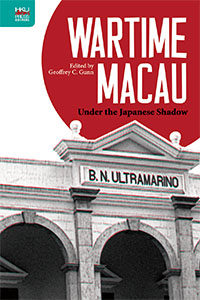Wartime Macau: Under the Japanese Shadow
Posted: December 1st, 2016 | No Comments »This collection, Wartime Macau: Under the Japanese Shadow, is most welcomed by me personally as a subject that has long fascinated. I have, in literary non-fiction style, written about the period myself – most recently in the September 2016 issue of Cha, the online literary journal based in Hong Kong with my piece Strangers on the Praia. Anyway, here are the proper academics weighing in on the subject. There’s a lot about Macao’s wartime history that remains secretive and of potential embarrassment to some of Hong Kong and Macao’s biggest families and companies, so I’m sure there’s still more to come out….
It has intrigued many that, unlike Hong Kong, Macau avoided direct Japanese wartime occupation albeit being caught up in the vortex of the wider global conflict. Geoffrey Gunn and an international group of contributors come together in Wartime Macau: Under the Japanese Shadow to investigate how Macau escaped the fate of direct Japanese invasion and occupation. Exploring the broader diplomatic and strategic issues during that era, this volume reveals that the occupation of Macau was not in Japan’s best interest because the Portuguese administration in Macau posed no threat to Japan’s control over the China coast and acted as a listening post to monitor Allied activities.
Drawing upon archival materials in English, Japanese, Portuguese, and other languages, the contributors explain how, under the high duress of Japanese military agencies, the Portuguese administration coped with a tripling of its population and issues such as currency, food supply, disease, and survival. This volume presents contrasting views on wartime governance and shows how the different levels of Macau society survived the war.
Geoffrey C. Gunn is an emeritus professor at Nagasaki University and author of History without Borders: The Making of an Asian World Region, 1000–1800.
“Wartime Macau deals with a fascinating and woefully understudied topic. The essays collected here show that there was no singular experience of World War II in Macau; how one experienced the war depended on a complex calculus of ethnicity, class, and connections. And yet, taken together, these experiences shaped the trajectory of the city’s political and social development for decades to come.â€
—Cathryn H. Clayton, University of Hawai‘i at MÄnoa
“This book represents a real breakthrough. Previous English-language accounts of Macau during the World War II have focused largely on the activities of the British in this neutral ‘Casablanca’. Drawing extensively on Portuguese, Japanese, and local Macanese sources, Geoffrey Gunn and his team have assembled a far broader picture, revealing the dilemmas and choices of Portugal’s beleaguered colonial government and placing Macau in a geopolitical context that stretched from the Azores to Australia.â€
—Philip Snow, author of The Fall of Hong Kong

Leave a Reply